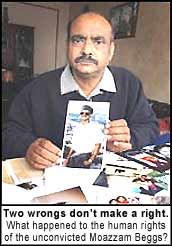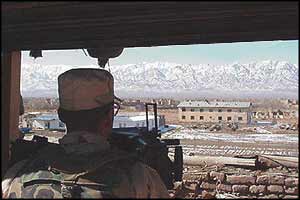Louise Christian
Two years ago today, Feroz Abbasi, a British citizen arrested in Afghanistan, was one of the first detainees to be transferred hooded, shackled and manacled by the USA military to Camp X-Ray in Guantanamo Bay. His mother, Zumrati, who lives in Croydon, was informed about five days later - by the media. It took a further six days for a British government official to contact her. Significantly, she was assured that her son did not need a lawyer.
Two years on, it is clear that the British government has betrayed the most fundamental responsibility that any government assumes - the duty to protect the rule of law. This abnegation of the essence of democratic government goes much further than a failure to protect the nine British citizens who are incarcerated in this legal black hole. It is nothing less than a collusion in an international experiment in inhumanity, which is being repeated and expanded around the world.

The UK government has been intimately involved in the nightmare world that is Guantanamo Bay from its inception. Britain sent its own security agents to interrogate its citizens and residents in the presence of the USA military without a lawyer present, and in the knowledge that techniques of sensory deprivation and coercion were being practised. For a full year and a half the British government refused to express any view on the legality of the detentions; not even of its own citizens and not even when challenged in the UK courts to do so.
In July 2003, military commission trials were announced for Feroz Abbasi and Moazzam Begg from Birmingham. Leaks from the Pentagon made it clear that a deal had already been secured. A show trial would take place, based on confessions extracted under duress, in which both men would plead guilty. Only under pressure from parliament and the media were junior ministers then authorised to make polite noises of feigned dissent. In July, an instruction was issued to the attorney general to enter into bogus negotiations to secure what it was already clear was not possible - a fair trial in Guantanamo Bay.
The extent to which our own government had become implicated in the Guantanamo Bay experiment should also have become apparent when they created their own replica model here. It was claimed by them to be superior, but mainly because they passed an undemocratic law, the Anti-terrorism Crime and Security Act, requiring a derogation from the newly enacted Human Rights Act. Consequently, 13 British residents are locked up indefinitely, without trial, in this country.
As with all prisoners detained for an indeterminate period, their mental health is severely affected. One has already been confined to psychiatric detention. Recently, the Privy Council committee set up to scrutinise the act concluded what should have been apparent from the outset: that such detention is unjustifiable. But, because of the lack of public outcry, the government looks set to ignore the committee.
Worldwide, the experiment is becoming the norm. It has been estimated that at least 15,000 people are being held without trial under the justification of the “war on terrorism”. They include more than 3,000 detained in Iraq after the war, of whom at least 1,000 are still in detention; an estimated further 1,000 to 3,000 detained at Bagram airbase in Afghanistan; and an unknown number being held on the British territory of Diego Garcia.
Bagram is a CIA interrogation centre, practising “stress and duress” or “torture lite”. An investigation has reportedly begun there after the deaths of two prisoners in suspicious circumstances. USA personnel stationed at Bagram have described the regular practice of sensory deprivation and sleep starvation, as well as incidents of throwing prisoners against walls while hooded.

Guantanamo Heavy.
Bagram detention centre is just one of many ‘prisons of convenience’ the USA have established around the world, to avoid the rule of its own laws.
Ironically, such revelations have surfaced not through any desire to expose human rights abuses, but in order to justify describing such treatment as “torture lite”. Meanwhile, three USA soldiers were discharged this week for beating and harassing Iraqi prisoners of war, and there are reports that British troops beat eight young Iraqis, one of whom died in custody as a result.
In the USA itself, the experiment continues. Over 1,000 people were arbitrarily detained in the immediate aftermath of September 11. The USA government refused to give names or details to civil rights groups. Many became subject to immigration procedures and were eventually deported. Inevitably, non-USA citizens in this situation receive no attention from the national media. But there are also three USA Muslims detained indefinitely as “enemy combatants”, two of whom were detained on USA soil.
One of these, Jos? Padilla, was seized out of the custody of the justice department by the Pentagon and placed on a military prison ship, accused of being in possession of a “dirty bomb”. In court proceedings, Vice-Admiral Lowell Jacoby of the USA military argued that detaining Padilla indefinitely without a lawyer was justified in order to gain information. Providing him access to counsel, so the logic went, “would create an expectation that his ultimate release might be obtained through an adversarial civil litigation process. This would break - probably irreparably - the sense of dependency and trust that the interrogators are attempting to create.”
It is of grave concern that the example being set by the USA and the UK is being used to legitimise repression internationally on an ever-increasing scale. From China, which has imprisoned up to 100 Chinese Muslims without trial, to Uzbekistan (up to 1,000), Yemen (200), Morocco, Saudi Arabia, Jordan, Egypt, India and Indonesia, this alarming lead is being eagerly followed. In Israel and Chechnya, there would be far more people in prison without trial had not the authorities there taken matters one step further and authorised extra-judicial killings. They were safe in the knowledge that the USA government boasted last year of killing alleged al-Qaida members in Yemen.
Yesterday, the comments of Pierre Richard Prosper, the USA ambassador on war crimes, disclosed what has been suspected for some time; that it is now the British and not the USA government that stands in the way of the British citizens detained in Guantanamo being returned home. When Tony Blair was asked about Guantanamo in the House of Commons this week, he spoke not about human rights abuses there but about what he described as the “immense importance” of the information gained from detainees.
What can an ordinary person do about a world turned on its head, where governments that claim to be democratic engage in repression, coercion and even torture on an international scale? Everyone needs to protest - peacefully, but as loudly and as persistently as they are able. Every act counts. And let everyone be certain of this: those who experiment in inhumanity will have no appetite to stop unless there is such protest.
Louise Christian is the lawyer acting for the families of three of the nine UK citizens, and for one British resident, illegally detained and interrogated by the USA in Guantanamo Bay.
Article courtesy of The Guardian
Moazzam Begg, 35, from Birmingham, was seized by Pakistani security forces in Islamabad in February 2002 and handed to the US military.
Feroz Abbasi, 23, from London. Captured by US forces in Afganistan in December 2001. Born in Uganda and came to Britain when he was eight.
Shafiq Rasul, a 24-year-old law student from Tipton, West Midlands, was captured by the Northern Alliance, and handed to the US in Afghanistan in December 2001
Asif Iqbal, 20, a parcel depot worker from Tipton. Held in Afghanistan. He went to Pakistan with his father, Mohammed, to find a wife.
Ruhal Ahmed, 20, from Tipton. Captured in Kandahar. Asif Iqbal and Rhuhel Ahmed were classmates in Tipton.
Jamal Udeen, a website designer, aged 35, from Hulme, near Manchester. Arrested in Afghanistan. Claims he was travelling and got caught up in the fighting.
Tarek Dergoul, a 24-year-old former care worker from east London. Arrested in Afghanistan.
Martin Mubanga, 29, a motorcyle courier from west London. His father is a Zambian government official. It is believed he was handed over to the US by Zambia.
Richard Belmar, 24, who attended a Catholic school in north London, and converted to Islam in his teens, after his elder brother. He worshipped at Regent’s Park mosque, close to his home in Maida Vale, London.
Visit the Center for Constitutional Rights, which represents many of the prisoners being held in Guantanamo Bay.